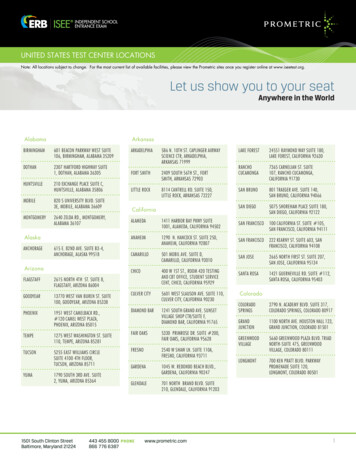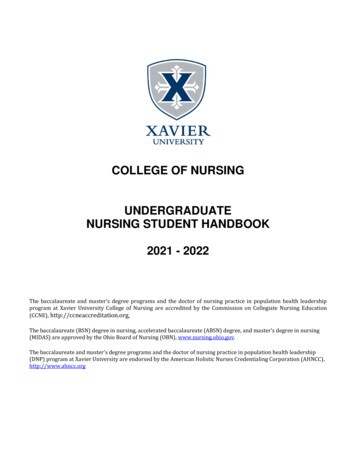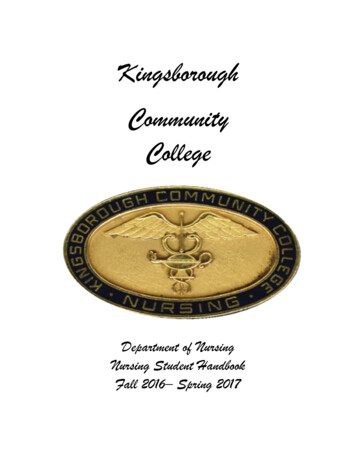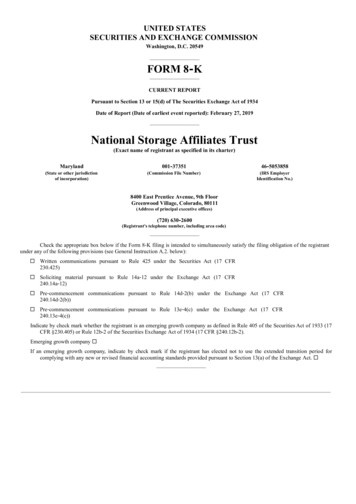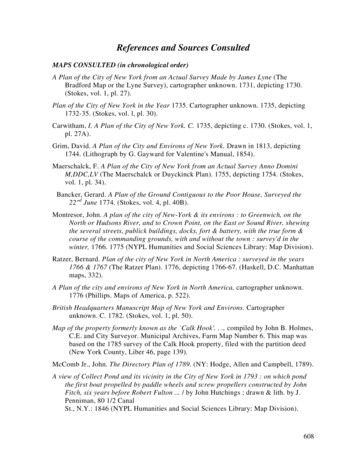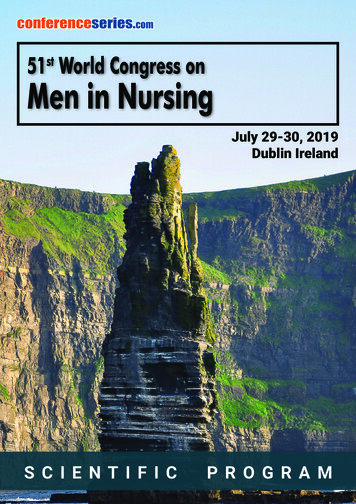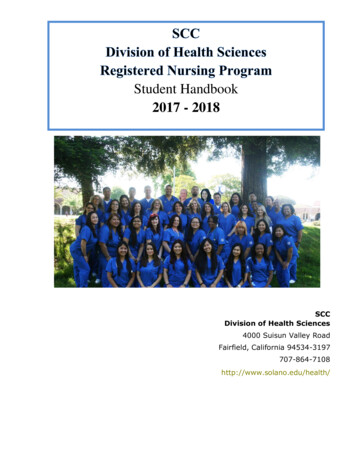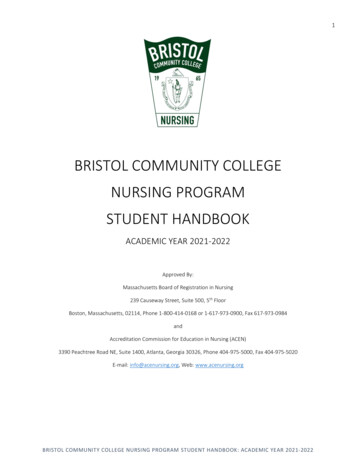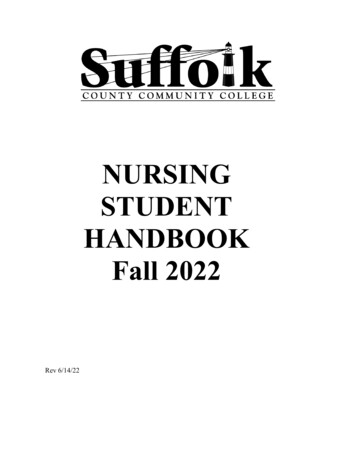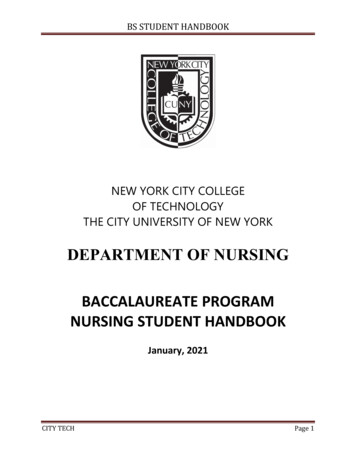
Transcription
BS STUDENT HANDBOOKNEW YORK CITY COLLEGEOF TECHNOLOGYTHE CITY UNIVERSITY OF NEW YORKDEPARTMENT OF NURSINGBACCALAUREATE PROGRAMNURSING STUDENT HANDBOOKJanuary, 2021CITY TECHPage 1
BS STUDENT HANDBOOKFOREWORDAll information contained herein is subject to change, deletion or modification. Approvedmodification, deletions or major changes will be published as they occur.Compiled: Spring 2006Updated by: Dr. Carmel (Candy)Dato, August 10, 2010Dr. Margaret Rafferty, October, 2012Dr. Margaret Rafferty, June, 2013Dr. Kathleen Falk, February, 2014Dr. Emma Kontzamanis, January, July, 2015, June, 2016, August, 2017Full Time Faculty, January, 2020Dr. Emma Kontzamanis, December, 2020, January, 2021CITY TECHPage 2
BS STUDENT HANDBOOKWelcome to New York City College of Technology(NYCCT) Nursing Baccalaureate ProgramYou are about to begin an important step in your professional journey. This exciting andchallenging phase of your education will provide you with additional knowledge, skills andexperiences to guide you in your path of lifelong learning. You will grow professionally andpersonally through interactions with faculty, fellow students, nursing staff and patients in clinicalagencies.The faculty is here to help you and facilitate your learning. Take advantage of opportunities anddon’t hesitate to seek out faculty and learning experiences.Students are responsible for being familiar with both NYCCT and the Nursing BaccalaureateProgram in terms of academic requirements and other policies. This handbook for baccalaureatenursing students provides information regarding the curriculum, specific courses, policies,procedures, available resources, and issues that are of concern to student academic life. It alsooutlines rights and responsibilities of RN-BS students.This Handbook acts as a companion to the College Catalog, which is another resource foracademic policies and procedures. These policies, and any additional Nursing Departmentpolicies and procedures relative to student records, publications, grievances and discipline, areconsistent with the Family Rights and Privacy Act of 1974. Please see the NYCCT CollegeCatalog and Student Handbook for important policies and procedures regarding nondiscrimination, policy on acceptable use of computer resources, immunization requirements,Freedom of Information Law, 224-A New York State Education Law, CUNY Student ComplaintProcedure, Student Disciplinary Procedures, Campus Safety and Security, Policy against SexualHarassment, Student Conduct Regulations and Special Programs to support students.Students are responsible for using the handbook as a resource when questions arise and as aguide to academic and nonacademic policies and procedures. Students need to be aware thatchanges made to policies and procedures may impact them as a student.Note that the information in this handbook is updated regularly. The information in thishandbook is accurate as of December, 2020. The Baccalaureate Program Nursing StudentHandbook, the NYCCT College Catalog and NYCCT Student Handbook are availableelectronically on the NYCCT website (http://www.citytech.cuny.edu/).We are delighted that you are here. Best wishes from the entire faculty.Heather A. Gibson, PhD, RNChairCITY TECHEmma Kontzamanis, PhD, RNRN-BS Program CoordinatorPage 3
BS STUDENT HANDBOOKBaccalaureate Program in NursingThe Bachelor of Science (BS) in Nursing degree program provides associate degree anddiploma prepared registered professional nurses with the education and skills necessary tobecome leaders and managers in a variety of health care settings. Baccalaureate prepared nursesare integral collaborative members of diverse interdisciplinary health care teams.The baccalaureate in nursing curriculum prepares nurses as generalists with experiencesacross the life span. This upper-level program provides didactic and clinical courses to meet theneeds of RN students. In addition to academic coursework in the classroom, students practicephysical assessment skills in a College laboratory setting. Select clinical agencies affordstudents dynamic learning opportunities to expand their knowledge base in leadership,community health, and in urban health issues.Nurses entering the program with an associate degree in nursing from a credit-grantinginstitution may have up to 60 credits transferred toward the 120-credit BS degree. Nursesseeking entrance to the program with a diploma or from an institution where college credit hasnot been granted will be required to take the Nursing Acceleration Challenge Exams (NACE) IIRN to BS (NLN NACE II Examinations) for acceptance of previous nursing courses.Upon completion of the program, nurses will have the foundation for both graduate studiesand advanced practice nursing roles.Mission Statement of the Baccalaureate Degree Nursing ProgramThe Baccalaureate Nursing Program at NYCCT aims to educate its diverse population ofstudents to achieve basic competencies resulting in the provision of safe nursing care. Thesecompetencies are informed by a wide array of knowledge, skills and attitudes which includecritical thinking, leadership, cultural awareness and communicative competence, an appreciationfor evidence-based practices, and utilization of emerging information technologies. In addition,students will acquire the values for interdisciplinary team-work, professional accountability,advocacy for change, an appreciation for the aesthetic dimension of life and work, and the desirefor life-long learning. The Program’s commitment to continuous outcomes assessment assureshigh quality education.Philosophy of the Baccalaureate Nursing ProgramThe Program’s philosophy is predicated on faculty beliefs regarding the metaparadigm ofnursing (persons, environment, health and nursing) and nursing education (the teaching/learningprocess). The faculty believes that nursing is an art and science with caring as an essentialelement. The faculty believes that caring is an integral component that is fundamental to nursingpractice and education. The practice of nursing is based on Watson’s Human Caring Theorywhich is an integral part of all human interactions. Caring embodies the nurse’s commitment tohealth by attempting to foster harmony in the physical, emotional, sociocultural and spiritualenvironment of persons. Persons move toward the fullest realization of their health potentialthrough gratification of human needs. These beliefs are explicated by the faculty in theProgram’s philosophy, the system of guiding principles and concepts underlying the program ofstudy.CITY TECHPage 4
BS STUDENT HANDBOOKPersonsThe faculty defines persons to include the individual, family and community. The facultybelieves that persons are holistic human beings with interacting subsystems (biologic,psychological, social and cognitive) and with inherent genetic bases and spiritual drives. Personspossess worth and dignity and have unique capabilities for reasoning, adapting to change andadvancing through developmental stages to maximize their individual potential. Persons interactwith their environments across the life span. In addition, they have rights and are deserving ofrespect with regard to their particular customs, beliefs and needs. Persons are to be valued, caredfor, cared about and understood. Persons also have rights to actively participate and collaboratewith health care providers in their plan of care.EnvironmentThe faculty believes that the environment is the context in which persons fulfill their basicneeds. The environment is comprised of two components: the internal and external systems.Interchange occurs between persons’ environmental systems. This interchange is impacted bypersons internal environment that consist of physiological, psychological, socio-cultural, spiritualand biophysical dimensions. The external environmental system consists of groups of humansconnected by common familial, geographical, socioeconomic, political, spiritual and culturalcharacteristics. Societal groups within the external environment such as families, communities,institutions and nations are interrelated and interdependent. The environment includes stressorsand resources to cope with the stressors. The viability of persons is a consequence of thecomplementary performance of societal roles. According to Watson’s Theory, nursing providespersons with a supportive, protective and/or corrective environment.HealthThe faculty believes that health is a state of wellness or optimal functioning. Health includesall aspects of life: physical well-being, social interactions, emotional capacity and the spiritualdimension. Persons’ health state influences the relationships and interactions of the individual,family and community. Health is a state of wellness within the health-illness continuum, asdefined in accordance with cultural norms and goals of the individual, family and community.The acquisition of health is an active process.Additionally, the faculty bases their belief about health on the simple and well-stateddefinition of health that the World Health Organization (WHO) developed over sixty years ago.The WHO defined health as “ a complete state of physical, mental and social well-being andnot merely the absence of disease or infirmity” (WHO, 1946).Health can exist in the presence of illness. Health and illness, viewed on opposite ends of acontinuum, are qualitatively different but interrelated concepts. Differing levels of health caninteract with the experience of illness. Illness is a discrete event of short or long duration that canoccur throughout the life process. The illness experience can inhibit or facilitate one’scontinuing quest for health.Health promotion is the domain of nursing which directs individuals, families andcommunities toward a reality of lifestyle practices and valuing of health that enhances a wellnessof mind, body and spirit and actualization of human potential.CITY TECHPage 5
BS STUDENT HANDBOOKNursingThe faculty believes that nursing is an evidence-based practice profession, which promotesoptimal health across the life span. Nursing is a humanistic, altruistic profession that assistspersons in the promotion, maintenance, restoration and/or rehabilitation of health and preparationfor death with dignity. Nursing is a dynamic profession impacting on stressors and forces withinthe environment. Conversely, environmental stressors and forces impact the goals and directionof nursing. Nursing assists persons through the promotion of a helping-trusting, human caringrelationship.The art and science of nursing are intertwined. Critical thinking skills are essential to thelogical interrelationship of knowledge from multiple disciplines in their application to nursingpractice. It is essential that Registered Nurses exercise clinical judgment in providingcomprehensive health care services to culturally diverse persons. Nursing is operationalizedthrough the interactive decision-making steps of the nursing process. The nursing process is atheory-based, systematic and holistic approach to nursing interactions. The use of evidencebased practice can best guide nursing in the 21st century as technology and change continue tounfold.Professional nursing is the practice of a scientific discipline that directly benefits societythrough decreasing disparities, promoting health and enhancing the quality of life. Nursesconsider regional, national and global health issues as they relate to such areas as diseasetransmission, health policies and health care systems. Nursing practice is caring, sensitive todiversity and accountable to the profession and to society. Nursing is in a key position topromote change in health care delivery.Nursing EducationThe faculty believes that baccalaureate nursing education prepares professional nurses with abroad knowledge of nursing, science, the humanities and the biological and social sciences. Thecurriculum encompasses a broad liberal arts education that is balanced with the natural andbehavioral sciences. This foundation or knowledge base is utilized in the development ofevidence-based nursing interventions, ethical standards and values that can be applied in avariety of practice settings.Professional nursing education focuses on the preparation of an expert nurse who is capableof functioning independently in primary, secondary and tertiary care settings withinmulticultural, multi-ethnic and urban communities. Professional nursing education encouragesthe development of values, sensitivity for culturally congruent care, ability to think critically,application of information technology, use of effective communication strategies, use of researchfor practice and ability to respond proactively to issues that impact nursing. Professional nursingeducation also provides an enriching stimulus that promotes student interest in advanced studiesand responsible citizenship.The baccalaureate nursing faculty’s beliefs are based on a humanistic collaborative model ofeducation that focuses on learning. Faculty members serve as learning guides, inspiring andmotivating students to develop their innate gifts. The faculty uses an extensive variety ofpedagogical techniques that promote active learning.CITY TECHPage 6
BS STUDENT HANDBOOKThe faculty believes that learning is a lifelong process that is independent and self-initiatedand results in potential or actual changes in behavior. Learning is a complex process thatevolves from the integration of psychomotor, cognitive and affective experiences, and occursbest when the person is actively involved in the pursuit of established goals. Although facultyand students share the responsibility for creating an educational climate that is conducive tolearning and encourages self-direction and inquiry, students must assume responsibility for theirown learning. The faculty shares knowledge, attitudes and expertise and invokes the role offacilitator, resource person and role model in the learning process.CITY TECHPage 7
Program OutcomesBS STUDENT HANDBOOKUpon completion of the Program, graduating students will be able to:1. Apply analytical reasoning and critical thinking skills in the incorporation ofknowledge synthesized from nursing, humanities and the biological and socialscience into professional nursing practice.2. Utilize information technology to include traditional and developing methods ofdiscovering, retrieving and using information in nursing practice.3. Effectively communicate with culturally diverse persons and disciplines in a caringmanner, using a variety of strategies.4. Utilize the nursing process to provide culturally competent care to persons across thelifespan.5. Collaborate with significant support people and members of the health care team toassist diverse persons to achieve identified goals.6. Assume a leadership role within the scope of professional nursing practice.7. Participate in research that focuses on evidence-based practice and utilize findings tosupport clinical decision making.8. Incorporate professional nursing standards and accountability into practice.9. Demonstrate a commitment to lifelong learning and personal and professionaldevelopment through continuing education and participation in professionalorganizations.10. Recognize the impact of economic, political, social and demographic forces affecting thedelivery of regional, national and global health care.Measurement of End-of-Program Student Learning Outcomes by Academic YearEnd-of-Program StudentLearning OutcomeELA1. Apply analyticalreasoning and criticalthinking skills in theincorporation of knowledgesynthesized from nursing,humanities and thebiological and socialscience into professionalnursing practice.2. Utilize informationProfessional NursingTerm Paper75% will achieve agrade of 80% orbetterCITY TECHCase 19202094.5%96%93%100%Data Analysis and ActionBenchmark consistently met over the pastthree years. Students were able to achievethe EPSLO’s at the ELA. Continue tomonitor.Benchmark consistently met over the pastPage 8
technology to includetraditional and developingmethods of discovering,retrieving and usinginformation in nursingpractice.3. Effectively communicatewith culturally diversepersons and disciplines ina caring manner, using avariety of strategies.4. Utilize the nursingprocess to provideculturally competent careto persons across thelifespan.5. Collaborate withsignificant support peopleand members of the healthcare team to assist diversepersons to achieveidentified goals.6. Assume a leadershiprole within the scope ofprofessional nursingpractice.BS STUDENT HANDBOOKfinal paper85% will achieve agrade of 80% orbetterPhysical AssessmentCultural Presentation75% will achieve agrade of 80% orbetterCommunity HealthAssessment andPlanProject75% will achieve agrade of 80% orbetterCommunity HealthAssessment andPlanProject75% will achieve agrade of 80% orbetterTeam DevelopmentDiscussion Forum90% will achieve agrade of 7 or betterthree years. Students were able to achievethe EPSLO’s at the ELA. Continue tomonitor.100%100%100%Benchmark consistently met over the pastthree years. Students were able to achievethe EPSLO’s at the ELA. Continue tomonitor.95%88%100%Benchmark consistently met over the pastthree years. Students were able to achievethe EPSLO’s at the ELA. Continue tomonitor.95%88%100%Benchmark consistently met over the pastthree years. Students were able to achievethe EPSLO’s at the ELA. Continue tomonitor.81.1%88.5%89%Benchmark not met. Students were unableto achieve the EPSLO at the ELA, but areimproving. Further discussion on ELAand/or Evaluation measure to occur inJanuary 2021 and possible changes in Fall2021Benchmark met in two of three years.Students are able to achieve the EPSLOs atthe ELA in 2018-2019 and 2019-2020. TheELA increased for the last two years and wewill continue monitorBenchmark met in two of three years.Students are able to achieve the EPSLOs atthe ELA in 2018-2019 and 2019-2020.Professional Nursing standards anddelegation were further incorporated intoNUR 3110 after difficulties noted with thisconcept. The ELA increased for the last twoyears and we will continue monitorBenchmark consistently met over the pastthree years. Students were able to achievethe EPSLO’s at the ELA. Continue tomonitor.7. Participate in researchthat focuses on evidencebased practice and utilizefindings to support clinicaldecision making.8. Incorporate professionalnursing standards andaccountability into practice.Nursing ResearchCritique 280% will achieve agrade of 75% orbetterDelegationDiscussion Forum80% will achieve agrade of 7 or better76%86%86%73%100%89.5%9. Demonstrate acommitment to lifelonglearning and personal andprofessional developmentthrough continuingeducation and participationin professionalorganizations.Professional Nursinge-portfolio80% will achieve agrade of 80% orbetter82%85%83%My PersonalLeadership Analysis80% will achieve agrade of 20 or better80%64.5%82%CITY TECHBenchmark met in two of three years.Students are able to achieve the EPSLOs atthe ELA in 2017-2018 and 2019-2020. TheELA increased for the last year and we willcontinue monitorPage 9
10. Recognize the impactof economic, political,social, and demographicforces affecting thedelivery of regional,national, and global healthcare.BS STUDENT HANDBOOKUrban Health Paper:Advocating forChange75% will achieve agrade of 80% orbetter98.5%97.5%94.5%Benchmark consistently met over the pastthree years. Students were able to achievethe EPSLO’s at the ELA. Continue tomonitor.Admission CriteriaApplicants for a Bachelor of Science Degree with a major in Nursing must be graduates of adegree-granting college or a diploma-granting nursing school that prepares students for licensureas Registered Professional Nurses.Graduates from degree-granting Associate Degree Programs who are candidates for admission tothe baccalaureate program in nursing at New York City College of Technology must have: Met the admission requirements for the College.Graduated from an Associate Degree Nursing Program.A current license in New York State as a Registered Professional Nurse or eligibility tosit for the NCLEX-RN Exam. Students must be licensed prior to registration in a nursingcourse with a clinical component.A 2.5 cumulative grade point average (GPA) on a 4-point scale to be reviewed foradmission. Preference will be given to applicants with a 3.0 GPA or above.Students applying to the program will be admitted based on space availability.In addition to the above admission criteria, candidates for admission to the program who holda Diploma or an Associate Degree in nursing that is not from an institution granting collegecredit may be admitted to the program with the following requirements: Successful completion of the Nursing Acceleration Challenge Exams (NACE) II RN toBS (NLN NACE II Examinations formerly called the NLN Mobility Profile Exams thatwere used for Nursing Progression). These tests designed for RN/BS programs are 55each plus shipping and handling. They are computerized tests that must be administeredby the College. They take between 2 ½ to 4 hours each. The examinations are:1. NACE II – Care of the Adult Client (219 items).2. NACE II – Care of the Client during Childbearing and Care of the Child (203 items,two exams in one).3. NACE II – Care of the Client with a Mental Disorder (132 items). Successful completion of all pre-major requirements in the Nursing Program, either byexamination or by completion of the appropriate courses.CUNY Residency Policy for Admission to Nursing Programs – All CUNY nursingdepartments require applicants for admission into nursing to provide documentation in one of thefollowing categories:CITY TECHPage 10
BS STUDENT HANDBOOK1) U.S. Citizenship;2) Permanent Residency;3) International Student with F1 Status;4) Granted Asylum, Refugee Status, Temporary Protected Status, Withholding ofRemoval, or Deferred Action Status by the U.S. government.Effective June 24, 2020:All CUNY nursing programs will consider applicants for admission who are eligible forlicensing in New York under the regulations of the New York State Education Department. Theregulation provides eligibility for citizens and non-citizens who are “not unlawfully present,”including those with Deferred Action for Childhood Arrivals (DACA) and those permanentlyresiding in the United States under color of law (PRUCOL).Applicants may demonstrate eligibility through documents that verify that they meet the requiredcriteria. The most common documents include:1. Proof of U.S. citizenship through a birth certificate, U.S. passport, naturalizationcertificate, or a certificate of citizenship.2. Proof of legal permanent resident status with what is known as a “Green Card”.3. Proof of various eligible categories, listed below, generally through an employmentauthorization document (EAD) or other satisfactory documentation.Eligible immigration categories:1. International student with F-1 status2. Asylee3. Refugee4. Temporary Protected Status (TPS)5. Deferred Action for Childhood Arrivals (DACA)6. Individuals paroled into the United States whose parole has not expired7. Persons residing in the U.S. pursuant to an Order of Supervision8. Persons granted a stay of deportation/removal9. Persons granted an indefinite voluntary departure10. Persons on whose behalf an immediate relative petition has been approved11. Persons who have filed an application for adjustment of status to permanent resident12. Persons granted Deferred Action Status13. Persons who entered and have continuously residency in the U.S. before 01/01/197214. Persons granted suspension of deportation or cancellation of removal15. Cuban/Haitian entrants16. Persons with a pending application for asylum, withholding of removal or deportation,protection under the Convention Against Torture (CAT), cancellation of removal, or TPS17. Persons in T or U non-immigrant status18. Self-petitioner under the Violence Against Women Act19. Other persons living in the U.S. who are not unlawfully presentCITY TECHPage 11
Progression in Nursing BS STUDENT HANDBOOKA 2.5 cumulative grade point average must be maintained.Students must achieve a grade of “C” on all nursing courses (NUR) and required coursesin the curriculum.A student may repeat only one of the required nursing courses.Courses designated NUR must be passed on the second registration.A grade of satisfactory (S) in the clinical component of nursing courses (NUR 3110,NUR 4010, NUR 4110) is required for passing the course.Only one Withdrawal for Academic reasons “W” from required nursing courses ispermitted.Students required to take NLN NACE II Examinations for previous nursing credit mustcomplete all tests with a satisfactory grade prior to enrolling in fourth semestercurriculum nursing courses (NUR 4110, NUR 4130).Grading Policy for all courses designated with the prefix NURGradeAAB BBC �82.9%77–79.9%75–76.9%60–74.9%Below 60Quality Points (Index)4.03.73.33.02.72.32.01.00.0Deans’s Honor ListThis academic honor is awarded to matriculating students who have a grade point average of 3.5.Please see NYCCT Student Handbook for more information.Honors Scholars ProgramEligible students are strongly encouraged to participate in the Honors Scholars Program. Pleasesee the NYCCT Student Handbook for more information.Nursing Honor SocietyThe BS program has an Honor Society to recognize excellence in Nursing Scholarship. Pleasecontact Dr. Kathleen Falk for more information.CITY TECHPage 12
BS STUDENT HANDBOOKClinical RequirementsEffective June, 2015, students must obtain clinical clearance from CastleBranch prior toenrollment in a course with a clinical component https://mycb.castlebranch.comStudents are required to submit health clearance, CPR, drug test and other documentation,including, but not limited to, New York State License, HIPAA, Infection Control and Fire Safetytrainings to CastleBranch. Students receive a notice from CastleBranch when any of the requireditems expire and need to be renewed.In order to comply with these standards students should Make an appointment with their health care provider to fill out health clearance forms. Register for an account with CastleBranch. Instructions are on the Nursing web pageunder Student Resources. Complete HIPAA, Infection Control and Fire Safety mandatory trainings throughMedcom https://www.medcomrn.com/citytechcuny/ Have drug screening through CastleBranch within the month prior to the start of eachsemester a student takes a clinical course (NUR3110, 4010 and 4110). Receive the Flu shot for each flu season. Have a criminal background check through CastleBranchHealth clearance is due about one month before attendance at a clinical site. Once you arecleared by CastleBranch, the school will receive a notification that you are cleared.A reminder that students who do not submit the necessary documentation will not be able toattend clinical.Transfer into the Nursing Curriculum Transfer students are required to follow college policies.The request to transfer non-CUNY nursing credits will be evaluated on an individualbasis by a nursing department faculty advisor and an official decision will be made by theregistrar.CUNY Articulation PolicyIn nursing, current formal CUNY articulation agreements are in effect with KingsboroughCommunity College, and Borough of Manhattan Community College Associate Programs inNursing.Add/Drop CoursesA student dropping co-requisites of a nursing course will also be required to drop the applicablenursing course.Readmission to the BS Nursing ProgramStudents seeking readmission to the Program must follow the College requirements forreadmission as well as the Policies of the Program.CITY TECHPage 13
BS STUDENT HANDBOOKTransportation, Uniforms and EquipmentAll students must provide their own transportation for laboratories, field trips and clinical siteassignments. Faculty and students must comply with CUNY Travel Policy.Dress CodeStudents must have their own lab coats, if required, and equipment for clinical assignments.Professional attire will be specified for each clinical course by the clinical professor incollaboration with agency liaison personnel. Students enrolled in the baccalaureate programmust comply with that dress code. Professional clinical attire is usually a clean white lab coat,knee length with the NYCCT emblem on the left sleeve OR a clinical uniform may also be loosefitting dark pants, a dark skirt that is knee length, white or light colored buttoned blouse (noplunging necklines) with sleeves (half or full length); clean, closed walking shoes with socks orstockings (no bare feet); no jewelry except for small stud earrings, small rings and a watch with asecond hand; nails are to be clean, trimmed (must be short), and if polished only neutral, lightcolors (no acrylic or gel polish, extensions or nail wraps); hair must be neat, clean, and worn offthe face and collar of the uniform top; no perfume; tattoos are to be covered. Students enrolledin NUR 3110L must wear a lab coat while in the hospital. The lab coat is to be fresh launderedand pressed. Students must wear their NYCCT ID. For information on NYCCT ID card, seeNYCCT Student Handbook. The hospital affiliate may also require an additional ID card.Student Participation in Program MeetingsStudents are strongly encouraged to attend various Program meetings to provide faculty withtheir views on departmental activities that affect their learning and success. Departmentmeetings are on Thursdays. The schedule is distributed to Faculty at the beginning of eachsemester. Faculty announce or distribute meeting dates in their classes.Suggested time for completion of the Nursing ProgramThe program is designed to be completed in two full time academic years. However, manystudents have completed some or all of their liberal arts requirements prior
nursing (persons, environment, health and nursing) and nursing education (the teaching/learning process). The faculty believes that nursing is an art and science with caring as an essential element. The faculty believes that caring is an integral component that is fundamental to nursing practice and education.
